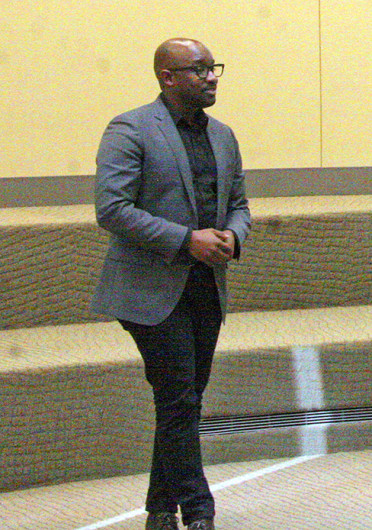
OSU alumnus Andre Banks, co-founder of All Out, an organization that seeks to end discrimination against the LGBT community, speaks at Ohio Union Oct. 25.
Credit: Brooke Sayre / Lantern photographer
When Andre Banks was a senior at Ohio State in 2000, he participated in a 28 day sit-in at Bricker Hall to campaign for better benefits and wages for custodial, landscaping and food service staff. Today, the OSU alumnus has expanded his social activism by helping form All Out, an international organization that seeks to end discrimination against the lesbian, gay, bisexual and transgender community.
The organization has nearly 1.9 million supporters worldwide.
Banks revisited his alma mater to discuss life after OSU, his campaign to promote worldwide equality for the LGBT community and the possibilities for building social movements in the 21st century. The lecture was held Friday at Ohio Union.
“The story of how I got to this path that eventually led to All Out, it really started here at Ohio State,” Banks, the co-founder and executive director of All Out, said during his talk.
Because of his involvement with the on-campus campaign for workers’ benefits during his time at OSU, Banks was recruited by the American Federation of Labor and Congress of Industrial Organizations, a nonprofit and one of the largest federations of unions in the U.S., shortly after receiving his political science degree. While working as the AFL-CIO student program coordinator, Banks met and over the years became friends with Benjamin McKean, an assistant professor of political science at OSU.
McKean was a main organizer of Banks’ speech, which was sponsored by the Department of Political Science, the Diversity and Identity Studies Collective’s Sexuality Studies program, the Honors and Scholars Center, the Student Life Multicultural Center and Scarlet & Gay, an OSU gay, lesbian, bisexual and transgender alumni organization.
Representatives from the Multicultural Center and the Honors and Scholars Center referred The Lantern to McKean for comment.
Banks said he and co-founder Jeremy Heimans launched All Out in 2011 after they worked together first for Purpose, a company that aims to help other organizations launch campaigns and use the Internet to drive large-scale participation in social issues. But Banks and Heimans wanted to start their own organization, and decided to focus on an issue they believed was not getting enough attention on a global scale: LGBT community rights.
“In 76 countries, it is a crime to be gay, and in 10, it can cost you your life … and in no country in the world are LGBT people treated equally under the law,” Banks said in an interview with The Lantern before his speech. He added All Out’s ultimate goal is to start the process of changing those laws and lead a movement that will ultimately decriminalize being lesbian, gay, bisexual and transgender.
All Out’s members work toward their goals by partnering with groups in each country they work in, including Russia and Sweden, to discover the best way to help address discriminatory problems the LGBT community faces. Banks said they take action in a variety of ways, but their method typically involves using the Internet to get people involved and start what he calls a “21st century movement.”
“We are engaging (members) in various tactics online … everything from signing a petition to being a part of a flash mob to making a donation,” he said in his speech.
Banks used the example of a 2012 initiative, which involved “kill lists” being used to target LGBT people in Iraq. All Out reached out to its members via email and social media and raised $60,000 in three days to help a local organization relocate about a dozen of the men on the lists.
The organization’s members also create original online content they intend to go viral, including videos, in an attempt to bring attention to the issues and increase support.
McKean said he invited Banks to speak in order to show students the power they have to take action.
“(Banks) shows what you can do in political action, shows what you can do with an OSU education and shows what you can do about issues of equality,” he said.
Megan Kupka, a second-year in Russian and international relations, attended the event and said she was struck by how the Internet could be used to inspire change.
“It was amazing to hear he (Banks) could do this sort of high-level activism through the Internet, and to gather support and to organize through a resource that’s available to almost everyone,” she said.
Banks said in his speech using “the language of the Internet” can be a powerful way of delivering a message and pulling people to action, and added he hoped his talk at Ohio Union helped emphasize that.
“I want them (students) to take away that there are new opportunities to build powerful social movements,” Banks said during his interview with The Lantern.


